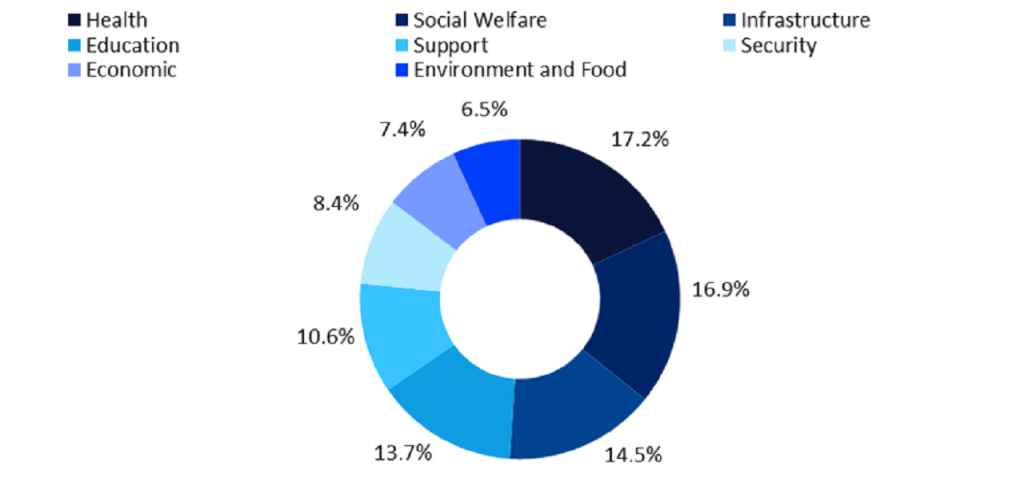Hong Kong’s financial secretary Paul Chan Mo-po delivered the Hong Kong Special Admistrive Region government’s financial year 2025-26 (FY25-26, April 2025 to March 2026) budget on 26 February 2025. As part of the latest budget, the total government expenditure is estimated to increase by 8.9%, from HK$754.8bn ($96.5bn) in the revised FY24-25 budget to HK$822.3bn in FY25-26; this represents 24.4% of the nominal gross domestic product. The expenditure is forecast to further register an average of HK$845.7bn from FY26-27 to FY29-30.
Overall, 17.2% of the total expenditure estimated for FY25-26 – equivalent to HK$141bn ($18bn) – is allocated for healthcare, followed by allocations for social welfare (16.9%), infrastructure (14.5%), and education (13.7%). Some of the major capital projects planned for commencement in FY25-26 include the construction of the Annex Block at Hong Kong Observatory Headquarters in Tsim Sha Tsui, the Tung Chung New Town Extension, the Yuen Long South New Development Area, a 30-classroom primary school at Area 89 in Tung Chung, a Clinical Training Amenities Centre at No. 6 Sassoon Road, and the first phase of the Hung Shui Kiu Effluent Polishing Plant, among others.

Infrastructure, manufacturing, healthcare, and housing are some of the key areas of focus in the government’s latest budget. The government announced that construction has begun on the first phase of the Northern Link (NOL), which includes the development of the Kwu Tung Station, with completion targeted for 2027. Advanced works on the second phase have also started to align with the projected completion of the NOL Main Line in 2034. The government is also working with the Shenzhen authorities to jointly implement two cross-boundary railway projects. The investigation and design study of the Hong Kong-Shenzhen Western Rail Link project, as well as the detailed planning and design of the Northern Link Spur Line, are expected to commence in 2025.
The government is focusing on developing primary healthcare, enhancing the quality of medical services, and promoting the development of the healthcare industry. It has also been improving public healthcare services and enhancing the patient experience, with initiatives such as shortening the waiting time for specialist outpatient services and making wider use of telehealth services. As part of the latest budget, the government reported that it is progressively implementing and completing 16 healthcare projects, which entail a total of approximately HK$190bn ($24.3bn), under the First Hospital Development Plan. The government will further review the distribution, scale, and priority of projects under the Second Hospital Development Plan and make announcements in due course.
In 2024, the government enhanced the New Industrialisation Funding Scheme to strengthen support for local manufacturing enterprises to shift to smart manufacturing. The scheme supported the creation of more than 100 new smart production lines, with a total investment of approximately HK$1.3bn ($166.3m), of which HK$930m ($119m) came from private investment. Similarly, in 2024, the government launched the New Industrialisation Acceleration Scheme to provide matching subsidies to enterprises building smart production facilities in Hong Kong. The first project application under this scheme was approved, involving a total investment of approximately HK$600m, with government funding contributing around HK$200m. As part of the latest budget, the government announced the introduction of the two-year Pilot Manufacturing and Production Line Upgrade Support Scheme, which will provide funding of up to HK$250,000 per enterprise operating production line in Hong Kong. Additionally, the government will develop a medium- to long-term plan for new industrialisation in Hong Kong and establish a HK$10bn Innovation and Technology Industry-Oriented Fund to channel more market capital into emerging and strategically important industries.
To support the tourism sector and implement the Development Blueprint for Hong Kong’s Tourism Industry 2.0, the government reported it will allocate HK$1.2bn to the Hong Kong Tourism Board in the coming year. In alignment with the government’s focus on bolstering Hong Kong’s research and development sector, the financial secretary allocated HK$1bn in the recent budget for the establishment of the Hong Kong AI Research and Development Institute. Furthermore, to complement the development of Hong Kong’s innovation and technology sector and promote the city as an international hub for tertiary education, the government reserved approximately 90 hectares of land in the Northern Metropolis for the creation of the Northern Metropolis University Town. In another development, the government announced the launch of a HK$300m subsidy scheme for mid-2025, aimed at supporting the installation of 3,000 fast chargers across Hong Kong by 2030, which will serve 160,000 electric vehicles.

US Tariffs are shifting - will you react or anticipate?
Don’t let policy changes catch you off guard. Stay proactive with real-time data and expert analysis.
By GlobalDataIn a boost to the domestic housing sector, the government has identified sufficient land to meet the target of supplying 308,000 public housing units over the next ten years. Including ‘Light Public Housing’, the total public housing supply in the next five years will reach 190,000 units. The government estimates that an average of 17,000 private residential units will be completed annually over the next five years, and it will prepare land for approximately 80,000 private housing units during this period.
To address the mounting financial challenges facing Hong Kong, the government is focusing on containing its deficit. Hong Kong is estimated to have registered a deficit of HK$87.2bn for FY24-25, marking the third consecutive shortfall. Land-related revenue, which has historically been a significant source of income, has dropped sharply in recent years. As of January 2025, Hong Kong had received HK$4.3bn in land revenue for the current fiscal year – just 12% of the HK$33bn target for FY24-25. In response, the financial secretary announced that the government will rely on cost-cutting measures rather than seeking new revenue sources to balance the budget. As part of the latest budget, the secretary revealed that Hong Kong would reduce recurrent expenditure by 7% cumulatively from now through FY27-28 to address the deficit amid economic headwinds.



